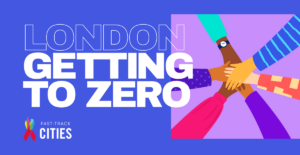Fast-Track Cities initiative
What is Fast-Track Cities?
Fast-Track Cities is an international initiative to end new cases of HIV by 2030. Over 200 cities across the world are part of this movement to get to zero new cases of HIV, zero preventable deaths, zero stigma and discrimination and a better quality of life for people living with HIV.
In January 2018, The Mayor of London, Sadiq Khan, signed the Paris Declaration on Fast-Track Cities Ending the AIDS Epidemic, along with London Councils, Public Health England and NHS England.
Jump to section
- An introduction to Fast Track Cities
- Targets of the programme
- Why is this initiative important?
- What are the challenges?
- What is involved in the initiative?
An introduction to Fast Track Cities
Targets of Fast-Track Cities
London has already made great strides towards achieving the United Nations (UN) targets for the Fast-Track Cities initiative. In 2016, for the first time in London, all the UN’s 90:90:90 targets were met. London is only the third city to achieve this target so far – joining Amsterdam and Melbourne. We have now reached:
- 95% of people living with HIV infection diagnosed
- 98% of people diagnosed receiving treatment
- 97% of people receiving treatment being virally suppressed.
Why is this initiative important?
HIV remains an important problem in London, with the infection impacting on Londoners more than any other part of the UK.
In 2020, there were 955 new cases of HIV, with an estimated 35,966 people living with HIV in London – almost 40 per cent of all those in the UK. Of these new cases, 349 of new diagnoses were reported among gay and bisexual and other men who have sex with men, 324 cases were among men and women who reported heterosexual sex as their probable route of infection, 14 cases were among people who inject drugs, 257 cases were among people with an undetermined exposure group and the remaining 11 were through pregnancy.
Recently, London has seen a significant fall in people newly diagnosed HIV positive, particularly in men who have sex with men. However, this fall is neither uniform across all population groups nor in all areas of the city, and rates of late diagnosis, although showing improvement, remain stubbornly high at 35 per cent. Late diagnosis significantly impacts people who are who are disproportionately affected by HIV like African, Afro-Caribbean and migrant women, trans women, gay men living with HIV who are also migrant men, men of colour and men who don’t have English as a first language.
People diagnosed late are at increased risk of developing an AIDS-defining illness and continue to have a more than 7-fold increased risk of death in the year following their diagnosis. The rate of one year mortality was 31 per 1,000 among those diagnosed late compared to 4 per 1,000 among those diagnosed promptly.
What are the challenges?
For many Londoners HIV remains a stigmatising condition that negatively impacts on quality of life. Late and undiagnosed infection rates in London remain unacceptably high (34 per cent and 10 per cent respectively) and with considerable geographical variability across the city. Prevalence varies by ethnicity and by place of residence, with disproportionately high rates among black and ethnic minority (BAME) communities in poorer areas of the city.
Read the national HIV public knowledge and attitudes survey results and blog.
What is involved in the initiative?
The Mayor and representatives from NHS England, UK Health Security Agency and Office for Health Improvement and Disparities (formerly Public Health England) and London Councils, have committed to work with partners to:
- Continue work to exceed the UN’s 90:90:90 HIV targets (90 per cent of people living with HIV knowing their status, 90 per cent of people with diagnosed HIV on treatment, 90 per cent of people on treatment with suppressed viral loads)
- End new HIV infections in the capital by 2030
- Put a stop to HIV-related stigma and discrimination
- Stop preventable deaths from HIV-related causes
- Work to improve the health, quality of life and well-being of people living with HIV across the capital
The next steps for the capital include delivering the action plan developed with all the partners and the HIV community, working with the support of the Fast-Track Cities London leadership group. The action plan is a roadmap, which outlines how London will reach the Fast-Track City targets.
London also has a Fast-Track Cities dashboard through which all cities report their progress against the initiative’s targets as well as locally set objectives and goals.
The Mayor has made tackling the stigma attached to living with HIV a key priority in his Health Inequalities Strategy. Not only is it important to ensure those living with HIV can live their lives without discrimination, but the fear of stigma can be a barrier to early diagnosis, which in turn negatively impacts the quality of life of those living with the condition.
Signing up to the Fast-Track Cities initiative will bring together all those already working to tackle HIV across the capital. More joint working will help to ensure that communities affected by HIV can access the prevention, testing, treatment and support they need.
Find out more
- Visit the Fast-Track Cities London website to find out more.
- Email hlp.londonftci@nhs.net to get in touch with the Fast-Track Cities London team.

